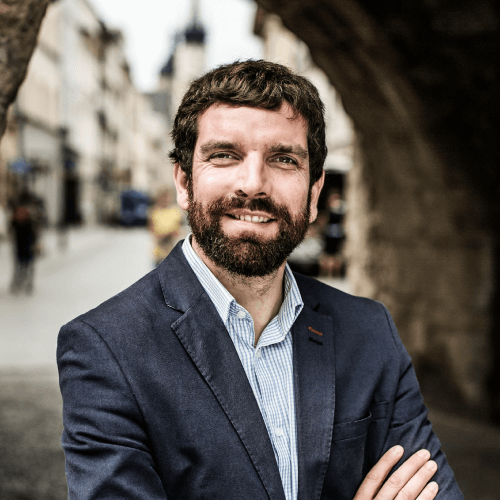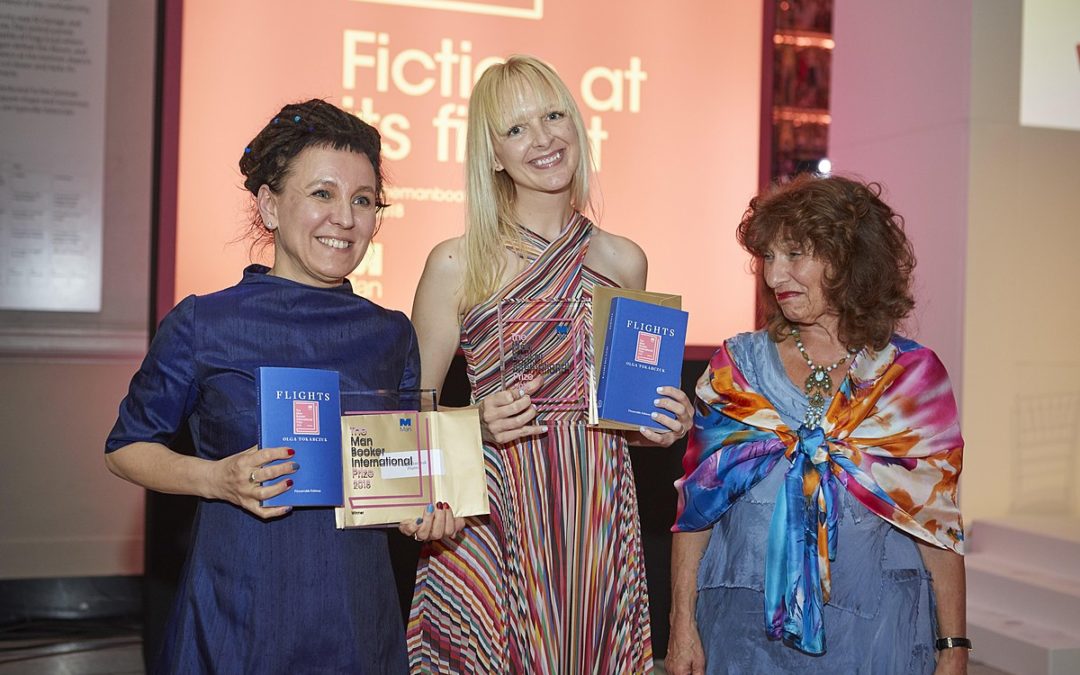Polish novelist Olga Tokarczuk has been awarded the Nobel Prize in Literature for 2018 by the Swedish Academy for “a narrative imagination that with encyclopedic passion represents the crossing of boundaries as a form of life”.
Jennifer Croft is one of two translators – along with Antonia Lloyd-Jones – who have brought Tokarczuk’s work into English. Notes from Poland editor-at-large Stanley Bill caught up with Croft after the announcement of the prize. You can listen to the full interview on our podcast here.
Stanley Bill: I want to start with your reaction to the news of Olga Tokarczuk winning the Nobel Prize in Literature. In fact, you predicted this several years ago. Why did you think she was going to win?
Jennifer Croft: So, firstly, predicting it and being fairly sure that it was going to happen did not mean that I did not scream and run around my apartment at four o’clock in the morning LA time when I found out, terrifying my two cats, who never forgave me. I think one of the main reasons I felt sure that Olga was going to win is the perfect balance she manages to strike between being supremely accessible to a general readership as well as critically acclaimed. It’s so rare for a writer to be able to do that – to be genuinely ambitious and undaunted by any kind of formal barriers.
SB: It’s something that always impresses me about Tokarczuk – she’s loved by readers, who flock to her readings and public appearances in Poland. She wins reader popularity awards, but at the same time, as you say, she’s critically acclaimed.
JC: That effect that she has on people at her readings also transcends language barriers. She just manages to speak to people. People gravitate towards her.
SB: Her extraordinary historical novel, The Books of Jacob, has received particular praise from critics in Poland as her masterpiece. You’re working on translating it into English now. Could you tell us about the book?
JC: Yes, it will be out in English in 2021. It’s the story of a historical figure named Jacob Frank who was the leader of a Jewish heretical sect in the 18th century. The book begins in 1752, and it follows a huge cast of characters as they are influenced by Frank in very different ways. There’s a lot of attention paid to the women in the story, which is also one of Olga’s hallmarks. I’ve never quite read anything like it.
SB: What really struck me about The Books of Jacob is the way in which the sights and sounds of this vast area between what’s now Poland and Turkey a few hundred years ago are brought to life in Olga’s prose. There’s something very sensual about so many of the descriptions in the book: the particular look or sound of a river, the particular smell of the grasses and flowers of a specific location. The characters also speak in very different voices. They are written as very distinct people in their tone and vocabulary. Is that a challenge, as you work on the translation: to reproduce differences in voices?
JC: I thought it would be more of a challenge than it is. Because Olga has done such a great job, I can just follow her lead. But I will second your emphasis on these sensual details. I’ve also never read anything that is so consistent about reminding me of where and when I am. The stakes are so high in this book, and so many important things are happening. But she never lets you forget that when these people walk out of meeting with high-up dignitaries, for example, they just step into mud. It becomes so vibrant that you really feel like you’re living this in a way that you couldn’t possibly do if you were reading the historical sources that Olga studied for about a decade before writing this book.
'The Swedish Academy has made many mistakes in recent years, but in Olga Tokarczuk, it has found not only a fine winner but a culturally important one.
You can’t go wrong reading this great Polish author, the dreadlocked feminist winner the Nobel needed' https://t.co/oLsqeEcILZ
— Notes from Poland 🇵🇱 (@notesfrompoland) October 10, 2019
SB: Could you tell us a bit more about the translation experience with Olga? You won the International Booker Prize together in 2018 for the novel Flights (Bieguni in Polish). Was there much dialogue between the two of you during the translation process?
JC: When Bieguni came out in Polish in 2007, I thought it was just so exciting and I really wanted to work on it. I met with Olga, but she has never been one to micromanage her translators. She really is the kind of writer who, when she’s done with the book, she’s done with it. I think that’s a great attitude to have.
SB: Flights takes place in various different settings in time and space. How would you characterise the novel?
JC: Olga describes Flights as a constellation novel. She gives the reader fragments, philosophical musings, anecdotes, and longer stories that are, on the surface, not connected to one another. She wants the reader to actively participate in the process. It is akin to walking out and looking up at the night sky and seeing this chaos of stars and drawing connections between those points of light in order to kind of make something meaningful for yourself. The response since it got some publicity has been overwhelming. So all the editors who told me for a decade that no one was going to read it are really kicking themselves now.
SB: You changed the title of the book in English. Could you tell us a little bit about why you did it and what the meanings are?
JC: Oftentimes the title of a book is changed by the publisher. The working title of Flights was “Runners” for many years. That had been proposed, I believe, by the Book Institute of Poland.
SB: And that’s an approximate translation of what the word “bieguni” means?
JC: Sort of. But the word in Polish is not the word for people who go jogging or who run marathons. It refers also to a religious sect. In this case, a Russian Orthodox sect that believed that you had to remain in constant motion in order to escape the devil. And that comes up, in the titular story. I hated the title “Runners” because in English it is so banal. And the Polish title, because it has this root bieg, is recognisable to speakers of Slavic languages as having to do with running. But most Poles would still have had to google the word “bieguni”. It’s an esoteric title, and I wanted something in English that would do exactly what I described in Olga’s writing in general – be simultaneously intellectually inviting but also accessible and simple, like the root bieg. So this title doesn’t just refer to plane travel. I tried to also incorporate the sense of the verb “to flee”, which I think is an important theme in Flights, and an important theme for Olga – this idea of having to escape. It’s an important topic of conversation in general in 2019. Then there are phrases like “flights of fancy”. So I wanted something that would be kind of sparkly and associative in the way that I felt the book is.
SB: I think it worked extremely well. I remember Olga saying at one of the Booker Prize events that the book – especially with your title – had taken on a new resonance in the aftermath of the migration crisis in Europe. She even said that if she were to rewrite the novel, she would include stories about refugees. Your own life has involved a lot of travel and migration. Can you tell us a bit about your path from Oklahoma in the United States into Polish culture?
JC: I started studying Polish at the University of Iowa pretty intensively for two years. Later I got a Fulbright to go to the University of Warsaw to translate contemporary women writers from Polish into English in 2003. That was a really interesting time to be in Poland, as the country was trying to decide whether to join the EU. Then I started going frequently to Krakow because the Polish Book Institute is headquartered there. I spent several whole summers as well as a full year academic year there. I always end up passing through Krakow at least. About a decade passed between when I lived in Warsaw and when I returned , which I can’t explain because I really liked Warsaw.
SB: So you go back regularly and you stay in contact with Polish culture and language? Is that important for you, translating from Polish – that you’re actually in contact with living language by being there?
JC: Yes, I felt that I would only work from a language if I could live in a country where that language was spoken. Otherwise I feel like I wouldn’t understand the daily rhythms of the way people speak. I think that I have spent less time in Poland recently then I would like to have. But I’ve been working with Olga for so long that I feel our relationship is independent of my relationship with Poland.
SB: Will you be travelling to Stockholm for the Nobel ceremony?
JC: Yes, I’m going for the speech and the presentation ceremony. I’m co-translating the speech with Antonia Lloyd-Jones.
SB: That’s very fitting. The two of you have created the reception of Olga Tokarczuk in the English-speaking world. Congratulations on your amazing work. It’s been an absolute pleasure to talk to you today.
JC: Thanks for having me.
This interview has been edited for length and clarity. You can listen to the full version on the Notes from Poland Podcast.
Jennifer Croft won the International Booker Prize in 2018, and was a National Book Award Finalist, for her translation of Olga Tokarczuk’s Flights. She also translates from Spanish. She has recently published her own first book, a memoir entitled Homesick. She currently divides her time between Buenos Aires and Los Angeles.
Main image credits: Janie Airey/Wikimedia Commons (CC BY-SA 4.0)

Stanley Bill is the founder and editor-at-large of Notes from Poland. He is also Professor of Polish Studies and Director of the Polish Studies Programme at the University of Cambridge. He has spent more than ten years living in Poland, mostly based in Kraków and Bielsko-Biała.
He is the Chair of the Board of the Notes from Poland Foundation.




















